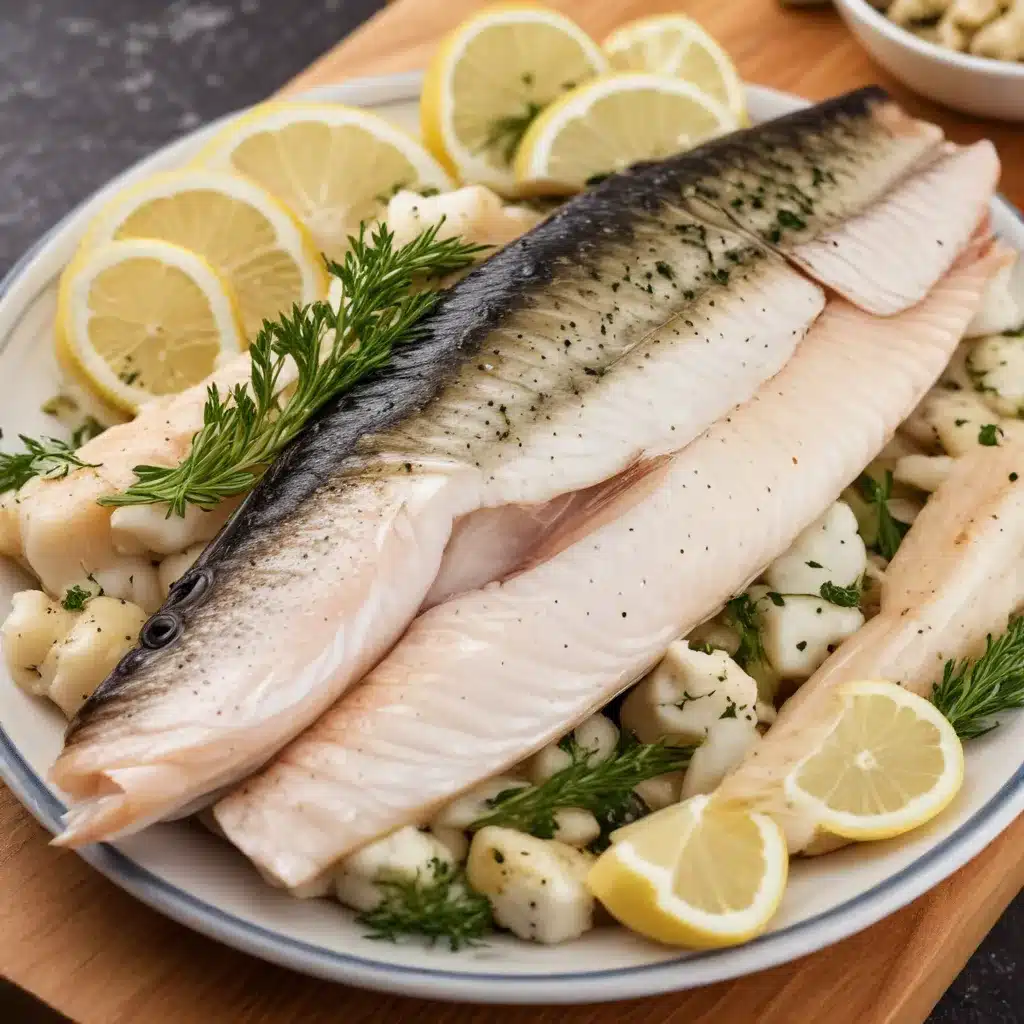
Cod is a beloved and nutritious white fish that has graced dinner tables for centuries. This saltwater species, found in the chilly waters of the North Atlantic and Pacific Oceans, offers a mild, slightly sweet flavor and a dense, flaky texture that makes it a versatile ingredient in a wide range of culinary preparations. But cod is more than just a delicious addition to your plate – it’s also packed with a remarkable array of health benefits that make it a true superfood for seafood enthusiasts.
The Nutritional Profile of Cod
At the heart of cod’s health-promoting properties lies its impressive nutritional profile. This fish is an exceptional source of high-quality protein, with a single 3-ounce serving providing a substantial 15 grams. Cod is also remarkably low in fat, containing just 0.5 grams per serving, making it an ideal choice for those watching their waistlines or managing conditions like heart disease or diabetes.
Beyond its macronutrient composition, cod is a treasure trove of essential micronutrients and vitamins. It’s an excellent source of vitamin B12, which plays a crucial role in red blood cell formation, neurological function, and DNA synthesis. Cod also boasts significant quantities of other B vitamins, including niacin, vitamin B6, and pantothenic acid, all of which contribute to energy production, metabolism, and overall cellular health.
But perhaps one of cod’s most remarkable attributes is its rich omega-3 fatty acid content. These heart-healthy fats, known as EPA and DHA, are essential for brain function, inflammation regulation, and cardiovascular wellbeing. A single serving of cod provides over 200 milligrams of these beneficial omega-3s, making it a valuable addition to any diet.
Cardiovascular Health Benefits of Cod
The omega-3 fatty acids in cod have been extensively studied for their ability to promote cardiovascular health. These remarkable compounds have been shown to help lower cholesterol levels, reducing the risk of heart disease and stroke. Additionally, omega-3s can improve blood circulation and vascular function, supporting overall heart health and reducing the likelihood of potentially life-threatening events.
Interestingly, cod’s protein and vitamin B12 content also contribute to its heart-protective properties. Adequate protein intake is crucial for maintaining healthy blood pressure levels, while vitamin B12 helps regulate homocysteine, an amino acid that, when elevated, can increase the risk of cardiovascular complications.
Cognitive and Mental Health Benefits of Cod
The same omega-3 fatty acids that benefit the heart also play a vital role in brain function and mental health. EPA and DHA are essential for the development and maintenance of neuronal membranes, facilitating efficient communication between brain cells. Studies have shown that regular consumption of cod and other omega-3-rich seafood can enhance cognitive abilities, mood regulation, and even reduce the risk of Alzheimer’s disease.
Furthermore, cod’s vitamin B12 content is crucial for proper brain function and nervous system health. Adequate B12 levels help prevent the cognitive decline associated with aging and may even mitigate the symptoms of depression and anxiety.
Musculoskeletal Health Advantages of Cod
In addition to its cardiovascular and neurological benefits, cod offers significant advantages for musculoskeletal health. Its protein content is essential for muscle growth and recovery, helping to build and maintain strong, lean muscle mass. Cod’s vitamin D and mineral content, including phosphorus and magnesium, also contribute to bone strength and density, reducing the risk of osteoporosis and fractures.
Interestingly, cod’s anti-inflammatory properties may also help alleviate joint pain and stiffness. The omega-3 fatty acids in this fish have been shown to reduce inflammation, potentially offering relief for individuals with conditions like arthritis or tendinitis.
Immune System Support from Cod
Cod’s nutritional profile also lends itself to robust immune system support. Its antioxidant properties, derived from the vitamin E, selenium, and other micronutrients it contains, help neutralize harmful free radicals and protect cells from oxidative damage. Additionally, the omega-3s in cod have been linked to improved immune function and reduced inflammation, which can enhance the body’s ability to fight off pathogens and maintain homeostasis.
Metabolic and Weight Management Benefits of Cod
Cod’s low-fat, high-protein composition makes it an excellent choice for those seeking to manage their weight or improve their metabolic health. The protein in cod can help promote feelings of fullness and satiety, reducing the likelihood of overeating and supporting weight loss efforts. Furthermore, research suggests that the omega-3 fatty acids in cod may enhance insulin sensitivity and increase energy expenditure, contributing to improved blood sugar regulation and more efficient fat burning.
Cod in Pregnancy and Childhood Development
The health benefits of cod extend beyond the adult population, making it a valuable addition to the diets of pregnant women and growing children. Cod’s omega-3 fatty acids, vitamins, and minerals are essential for fetal development and growth, supporting the cognitive, neurological, and immune system functions of the developing child. Studies have shown that regular cod consumption during pregnancy and early childhood can lead to enhanced cognitive abilities and improved overall health outcomes for the child.
Sustainable and Ethical Cod Consumption
When it comes to seafood, sustainability and responsible sourcing are crucial concerns. Fortunately, cod is considered a well-managed and relatively sustainable fishery, thanks to the implementation of strict regulations and conservation efforts in many regions. By choosing responsibly sourced cod from certified sustainable sources, seafood enthusiasts can enjoy the numerous health benefits of this versatile fish while supporting environmentally-conscious fishing practices.
Cod’s culinary versatility also makes it an excellent choice for a wide range of dishes, from classic fried fish and chips to more sophisticated preparations like sous vide, en papillote, or ceviche. Whether you prefer your cod baked, grilled, or pan-seared, this nutrient-dense seafood can be seamlessly incorporated into a gluten-free or low-carb diet, making it a crowd-pleasing option for any occasion.
So, whether you’re a seasoned seafood connoisseur or just looking to diversify your culinary repertoire, consider adding more cod to your plate. With its impressive nutritional profile, health-promoting properties, and sustainable sourcing options, this white fish is a true gem in the world of sustainable and delicious seafood.

